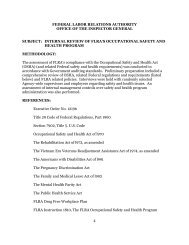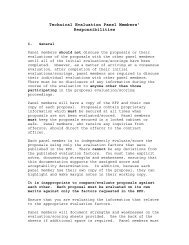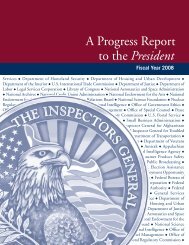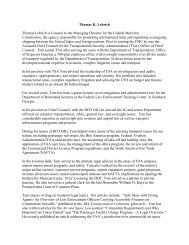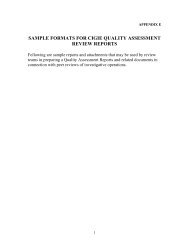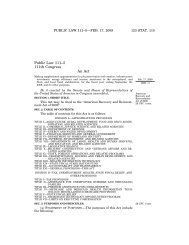GAO-12-208G, Designing Evaluations: 2012 Revision
GAO-12-208G, Designing Evaluations: 2012 Revision
GAO-12-208G, Designing Evaluations: 2012 Revision
Create successful ePaper yourself
Turn your PDF publications into a flip-book with our unique Google optimized e-Paper software.
Why Conduct an<br />
Evaluation?<br />
Chapter 1: The Importance of Evaluation<br />
Design<br />
Federal program evaluation studies are typically requested or initiated to<br />
provide external accountability for the use of public resources (for<br />
example, to determine the “value added” by the expenditure of those<br />
resources) or to learn how to improve performance—or both. Evaluation<br />
can play a key role in strategic planning and in program management,<br />
providing feedback on both program design and execution.<br />
<strong>Evaluations</strong> can be designed to answer a range of questions about<br />
programs to assist decision-making by program managers and<br />
policymakers. <strong>GAO</strong> evaluations are typically requested by congressional<br />
committees to support their oversight of executive branch activities. A<br />
committee might want to know whether agency managers are targeting<br />
program funds to areas of greatest need or whether the program as<br />
designed is, indeed, effective in resolving a problem or filling a need. The<br />
Congress might use this information to reallocate resources for a more<br />
effective use of funds or to revise the program’s design.<br />
The Congress also directly requests agencies to report on program<br />
activities and results. For example, legislative changes to a program<br />
might be accompanied by a mandate that the agency report by a specific<br />
date in the future on the effectiveness of those changes. Agencies may<br />
choose to design an evaluation to collect new data if they are unable to<br />
satisfy the request from available administrative data or performance<br />
reporting systems. They may also evaluate pilot or demonstration projects<br />
to inform the design of a new program.<br />
GPRA performance reporting requirements were designed to provide<br />
both congressional and executive decision makers with more objective<br />
information on the relative effectiveness and efficiency of federal<br />
programs and spending. However, due to the influence of other factors,<br />
measures of program outcomes alone may provide limited information on<br />
a program’s effectiveness. GPRA encourages federal agencies to<br />
conduct evaluations by requiring agencies to (1) include a schedule of<br />
future program evaluations in their strategic plans, (2) summarize their<br />
evaluations’ findings when reporting annually on the achievement of their<br />
performance goals, and (3) explain why a goal was not met. Federal<br />
agencies have initiated evaluation studies to complement performance<br />
measures by (1) assessing outcomes that are not available on a routine<br />
or timely basis, (2) explaining the reasons for observed performance, or<br />
(3) isolating the program’s impact or contribution to its outcome goals<br />
(<strong>GAO</strong> 2000).<br />
Page 4 <strong>GAO</strong>-<strong>12</strong>-<strong>208G</strong>




